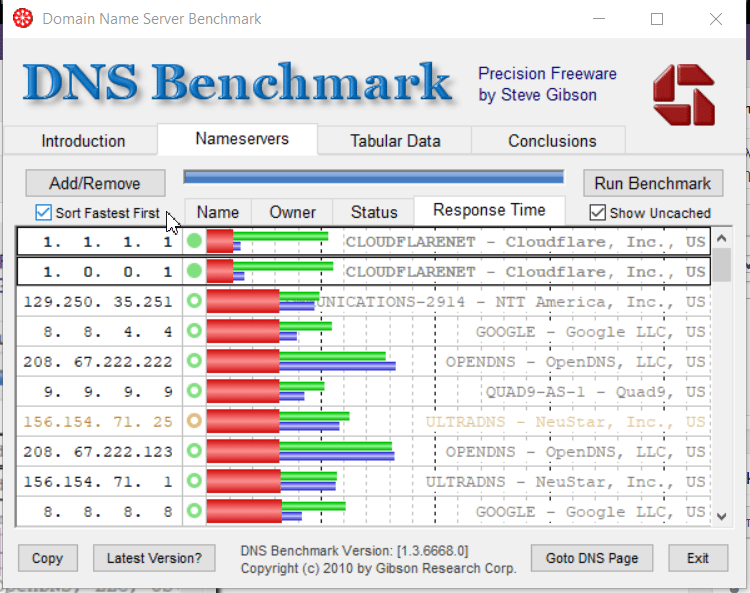
#Dns benchmark download
#Dns benchmark how to
Supported OS: Windows 10/8.1/8/7/XP/Vista How to Use DNS Jumper? It has a collection of DNS servers available for different regions, making it suitable for devices all over the world. It has a neat and somewhat traditional GUI. The size of the file is less than 1 MB which makes it pretty lightweight. It is considered to be one of the best tools for finding the best DNS for your network. It offers some incredible features like accessing blocked websites, blocking websites with inappropriate content and more.

#Dns benchmark software
Sordum is an open-source developer and provides high-quality software for free. It is quite simple to operate tool and beginners can use it easily.ĭNS Jumper allows users to improve the browsing speed and security by finding the perfect DNS for the user. It is a feature-rich and one of the best DNS benchmarking tools available for different platforms. DNS Benchmark is a freeware, and you can download it from their official site.ĭeveloped by Sordum, you can use DNS Jumper without installation. It is a handy tool for people who are concerned with speed and security. Clicking on the “Add/Remove” button will allow you to add the best DNS server.

The content of the first two columns is IP address and status indicators respectively. The sub-tabs determines the contents of the third column.
#Dns benchmark Pc

This utility tool provides its user a detailed report about the DNS server, enabling the user to find the suitable DNS server. It has a neat and simple UI that can be easily used by complete beginners. What's more, extensive testing has shown that even within the United States it is possible to locate and identify useful DNS resolvers that are much faster than any of those supplied by the built-in default list.Developed by Gibson Research Corporation, DNS Benchmark is one of the best DNS benchmarking tools available on the internet. Since GRC's DNS Benchmark will be used across the entire Internet-connected planet, the Benchmark's built-in default United States-centric DNS resolvers would be useful to residents of the US, but far less useful to users in other countries.

This fact argues for the benefits of locating the DNS resolvers that are geographically nearest to the computer(s) whose DNS access you are interested in optimizing. Of these three factors, experience has shown that network distance outweighs everything else. The three factors that most affect the delivered performance of a remote nameserver are the nameserver's overall speed, the network distance separating your computer from the remote resolver, and the intervening network's congestion at the time the DNS query is made. Every person who has built a custom list has discovered DNS resolvers that are faster than any they had previously known existed. Our experience with this approach has been a tremendous success. This "fastest 50", which would be much more relevant for each individual user, would replace the Benchmark's default built-in list. Version 1.1 of GRC's DNS Benchmark added the major new feature of rapidly scanning a global master list of nearly five thousand (4,854 at the time of this writing) known potential DNS resolving nameservers and building a fully customized list of the top 50 fastest responding resolvers. “You can't optimize it until you can measure it”


 0 kommentar(er)
0 kommentar(er)
